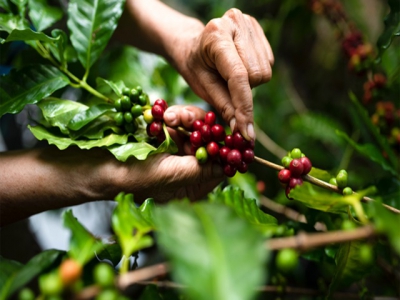Japanese beverage firm supports sustainable farming in Vietnam

Japanese beverage company Kirin Holdings is increasing support for coffee growers in Vietnam amid growing consumer demand for sustainable products.
A farmer picks coffee berries in the central highlands province of Gia Lai. Photo by Shutterstock/Somchai_Stock.
The company aims to extend support to farms in 700 locations, double the current figure, by the end of the year, by training farmers in sustainable production methods to help them obtain certification from an international accreditation organization, according to a Nikkei report.
Kirin helps Vietnamese coffee growers get certification from U.S.-based nongovernmental organization Rainforest Alliance.
To be certified, farmers must refrain from using excessive amounts of agrochemicals and work to protect biodiversity.
Since last year, Kirin has supported 350 Vietnamese coffee farms, helping growers conserve water, protect rivers from pollution and introduce better cultivation methods for areas with low sunlight.
Vietnamese coffee represents about 30 percent of the ingredients used by Kirin in its products, such as canned coffee beverages.
One issue for the company has been fluctuating output among Vietnam's many small coffee growers.
By assisting these farmers, Kirin aims to improve the quality of its own products and ensure steady production.
Vietnam is the world's second-largest coffee bean producer after Brazil.
Vietnam exported $2.74 billion worth of coffee last year, down 4.2 percent from 2019, according to Vietnam Customs.
Total areas covered by coffee farming was estimated at 680,000 hectares last year, down 2 percent from 2019, according to the Ministry of Agriculture and Rural Development.
Có thể bạn quan tâm
 Minister proposes export of passion fruit, sweet potato to China
Minister proposes export of passion fruit, sweet potato to China Vietnam recently sent dossiers to China to request opening the Chinese market to Vietnam’s durian and sweet potato products.
 Thai sugar beats domestic supply
Thai sugar beats domestic supply Since Vietnam implemented commitments in the ASEAN Trade in Goods Agreement (ATIGA) for the sugar industry, Thai sugar has poured into the country.
 Durian farmers' incomes rise after improving quality, yield
Durian farmers' incomes rise after improving quality, yield Farmers in Cai Lậy District, the largest durian producer in Tiền Giang Province, have raised their income by improving yield and quality with the use of advance
 Đồng Tháp expands high quality rice cultivation
Đồng Tháp expands high quality rice cultivation More rice farmers in the Cửu Long (Mekong) Delta province of Đồng Tháp have switched to growing high-quality rice varieties, which sell well and offer high
 Việt Nam's agriculture needs support from foreign partners in development: MARD
Việt Nam's agriculture needs support from foreign partners in development: MARD Việt Nam needs support from international partners to cope with losses due to climate change and the COVID-19 pandemic